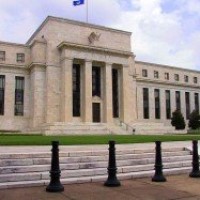Middle class savers and elderly hurt by stealth tax

Our Constitution gives Congress the power to levy federal taxes, not the Federal Reserve. This hidden tax falls hardest on seniors and near-retirees who are not rich and can ill afford to take a lot of risk with their investments.
By J. Victor Thompson at Center for a Just Society
The U.S. Federal Reserve recently announced that it would continue its policy of holding overnight interest rates between zero and 0.25% into 2014. It also stated that it may consider another bond buying binge to keep the downward pressure on longer-term interest rates. As small savers know, this means that they will continue to earn close to zero on their cash and will be lucky to find certificates of deposit that earn much more than 1%. At the same time the Fed has announced that while American’s earn these miserly rates on their savings it will target a 2% inflation rate.
Who will be the winners and losers from this new policy? One thing is clear, retirees and those nearing retirement are sure to be among the losers. The conservative saver will have a hard time finding a safe, short-term, liquid investment that exceeds the 2% inflation target. Accepting a safe, but low-return investment that does not beat inflation means that the saver’s purchasing power slowly withers. The new formal policy of setting the inflation target 2% over the overnight cash rate target is in effect a wealth tax. It is a tax that congressmen neither had a chance to vote on nor debate. Who is the winner from this new stealth tax? It must be the biggest borrower – the Federal Government since it can borrow vast sums of money at negative real interest rates. In essence, in inflation-adjusted terms, investors are willing to pay the U.S. Treasury to borrow money from them. To avoid the implicit wealth tax investors will be tempted to take more risk than they might otherwise be inclined to, merely to have a chance to earn a positive, after-inflation return on their savings. This is exactly what the Federal Reserve is hoping for: that investors will spend their cash and bid up the price of risky assets.
Is it possible that interest rates are too low? The premise has been that low interest rates will fix the housing market and stimulate economic activity. Although this has worked in the past, both housing and the broader economy remain weak. Other factors are at work holding back the economy, such as a raft of new Federal regulations, consumer deleveraging and a hangover of bad mortgages from the last boom. It may even be the case that these ultra-low interest rates are restraining consumption as the growing number of baby-boomer retirees who now live off their savings cut back. After all, the Fed’s announced policy is effectively a wealth tax and tax increases never stimulate the economy.
Most importantly this new wealth tax is just not right. Our Constitution gives Congress the power to levy federal taxes, not the Federal Reserve. This hidden tax falls hardest on seniors and near-retirees who are not rich and can ill afford to take a lot of risk with their investments. Whether the Fed’s policy is good or bad for the economy really is not the point.
The point is that this is a stealth tax on all assets that are expected to earn less than 2%, which includes nearly all of the deposits that Americans hold in banks. Under our Constitution Congress has the power to tax. We need a law that says if the Federal Reserve deliberately sets short-term interest rates below the rate of inflation for a sustained period then Congress and the President need to approve the move, as they would in passing any other tax increase. Citizens could then once again have taxation with representation.
J. Victor Thompson, CFA, is President of Bulwark Capital. Please email your comments to forum@centerforajustsociety.org.
The CJS Forum seeks to promote an open exchange of ideas about the relationship between faith, culture, law and public policy. While all the articles are original and written especially for the CJS Forum, they do not necessarily reflect the views of the Center for a Just Society.
Picture above from Wikimedia Creative Commons
Help Make A Difference By Sharing These Articles On Facebook, Twitter And Elsewhere:
